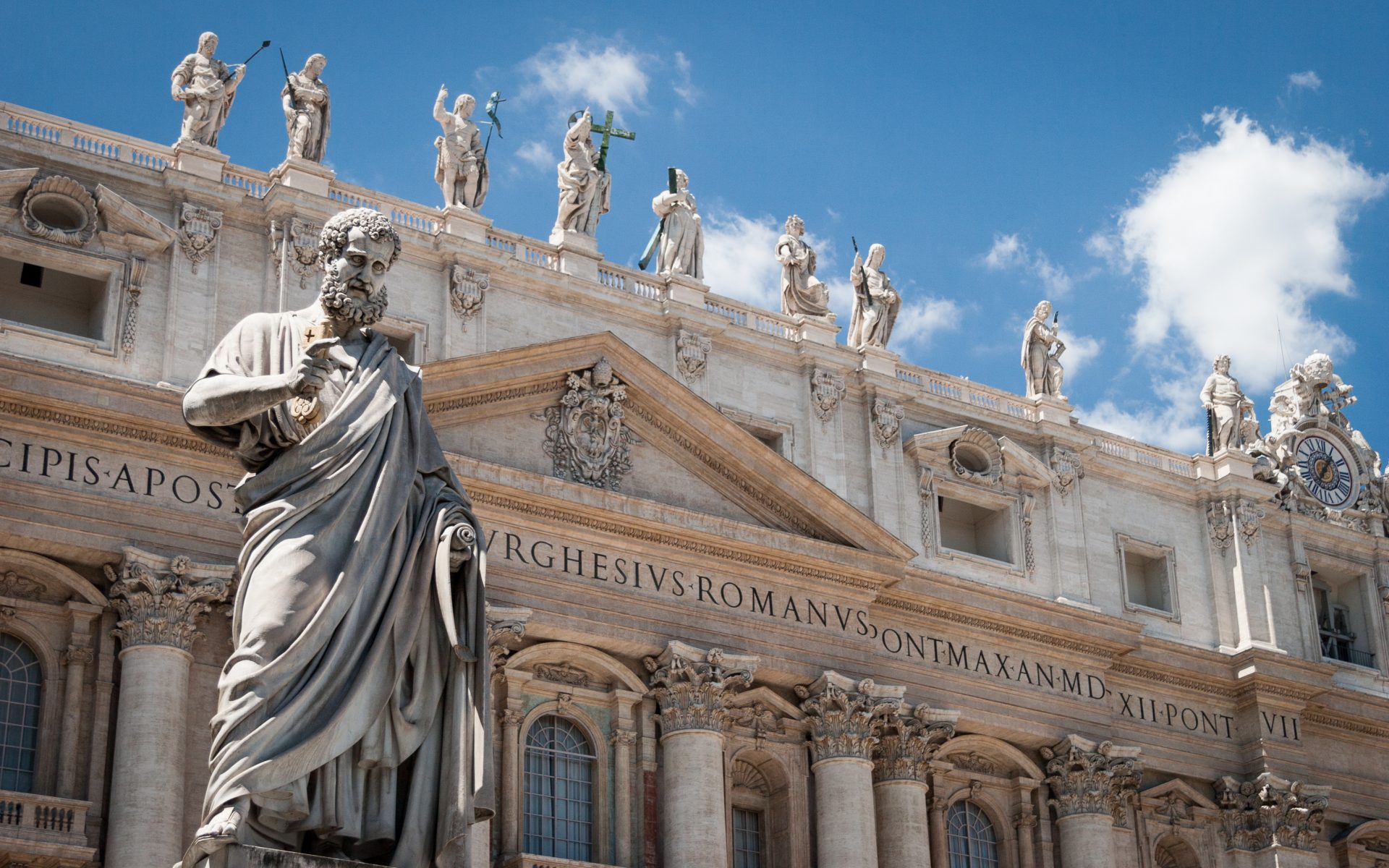When the world’s on fire . . . we need each other.
— Francis A. Schaeffer
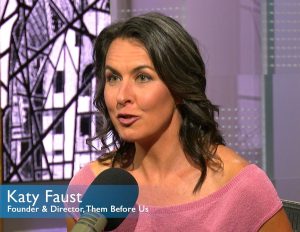 “I have far more in common with faithful Catholics than with progressive Protestants,” writes the evangelical Katy Faust in her recent essay “No Time for Friendly Fire.” Faust is a premier national voice for the pro-family cause and the founder of Them Before Us in Seattle.
“I have far more in common with faithful Catholics than with progressive Protestants,” writes the evangelical Katy Faust in her recent essay “No Time for Friendly Fire.” Faust is a premier national voice for the pro-family cause and the founder of Them Before Us in Seattle.
Faust shares: “Over the years, I’ve stood shoulder to shoulder with Catholic friends in the trenches on some of our most significant cultural battles: fighting the transgender juggernaut, overturning Roe v. Wade, and defending parental rights against government overreach. None of those victories could have been accomplished had either side fought alone.”
At those words, the late Chuck Colson must have smiled.
Chuck Colson
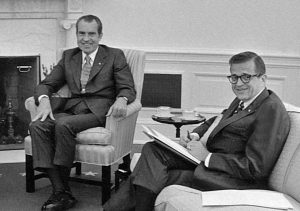 Colson died in 2012. During his life, he served as a top aide to President Nixon and was known as “The Hatchet Man,” but he later converted to Christianity. For many years, he was widely regarded as the most powerful voice for the pro-family, Evangelical movement in the United States. He spent much of his later life forming a strategic alliance between Evangelicals and Catholics.
Colson died in 2012. During his life, he served as a top aide to President Nixon and was known as “The Hatchet Man,” but he later converted to Christianity. For many years, he was widely regarded as the most powerful voice for the pro-family, Evangelical movement in the United States. He spent much of his later life forming a strategic alliance between Evangelicals and Catholics.
It lasts to this day.
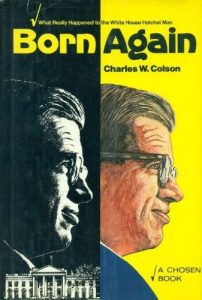 “It’s high time that all of us who are Christians come together regardless of the differences of our confessions and our traditions and make common cause to bring Christian values to bear in our society,” Colson wrote in the Foreword to the 1990 book Evangelical Catholics. “When the barbarians are scaling the walls, there’s no time for petty quarreling in the camp.”
“It’s high time that all of us who are Christians come together regardless of the differences of our confessions and our traditions and make common cause to bring Christian values to bear in our society,” Colson wrote in the Foreword to the 1990 book Evangelical Catholics. “When the barbarians are scaling the walls, there’s no time for petty quarreling in the camp.”
The last 50 years have shown good reasons to keep this great alliance strong and growing, as Faust is encouraging us to do today. Let’s take an inventory.
Common Moral Ground
We have a common enemy.
The deepest, most controversial issues that divide our society today nearly always relate to sexual ethics. “Premarital intercourse, fidelity versus adultery, abortion, contraception, homosexuality, divorce – the most popular objections to Christian morality are all against the Christian view of sex,” notes Peter J. Kreeft of Boston College.
That is, the areas of common ground include the most devastating to a culture that has largely adopted the norms of the Sexual Revolution (1965–1975). Against such a Revolution stand faithful Catholics and Evangelicals on issues such as:
- Pro-life (anti-abortion)
- Pro-marriage (anti-gay ‘marriage’)
- Pro-purity culture (anti-promiscuity, anti-pornography)
- Pro-male and female (anti-transgenderism, anti-homosexuality)
- Pro-natural death (anti-euthanasia, anti-assisted suicide)
- Pro-religious liberty
In sum, both Catholics and Evangelicals are concerned about the “breakdown of the family and the deterioration of the respect for human life,” said Prof. Russell Hittinger, a law professor at the University of Tulsa.
History of the Catholic-Evangelical Alliance
Here is a brief outline of the nearly 50-year alliance as provided in part by the Catholic League:
• In the 1980s, Catholic activist Paul Weyrich and Rev. Jerry Falwell founded the Moral Majority.
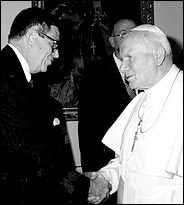 • In the 1990s, there was groundbreaking unity as Catholic theologian Father Richard John Neuhaus and Evangelical leader Chuck Colson unified in the formal declaration of “Evangelicals and Catholics Together”. (For the text, as well as a list of participants and endorsers, click here.)
• In the 1990s, there was groundbreaking unity as Catholic theologian Father Richard John Neuhaus and Evangelical leader Chuck Colson unified in the formal declaration of “Evangelicals and Catholics Together”. (For the text, as well as a list of participants and endorsers, click here.)
• Also in the 1990s, the Christian Coalition President Ralph Reed and Family Research Council President Gary Bauer reached out to Catholics.
• Then in the early 2000s, Catholics such as Dean Hudson and William Donahue united with Tony Perkins of the Family Research Council and Dr. James Dobson of Focus on the Family. Their teamwork was key to electing President George W. Bush in 2004.
• In 2009, many signed the Manhattan Declaration calling on Evangelicals, Catholics, and Orthodox to stand together for family issues.
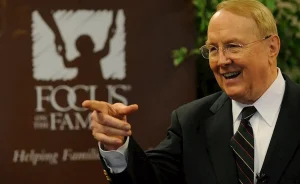 The great Dr. Dobson, a living hero to many Evangelicals and the Founder of Focus on the Family, shares:
The great Dr. Dobson, a living hero to many Evangelicals and the Founder of Focus on the Family, shares:
“When it comes to the family, there is far more agreement than disagreement, and with regard to moral issues from abortion to premarital sex, safe-sex ideology, and homosexuality, I find more in common with Catholics than with some of my evangelical brothers and sisters.”
In late 2000, Dobson flew with Colson to the Vatican and attended a meeting on the global status of the family. They met briefly with the Pope.
Fundamentals of the Faith
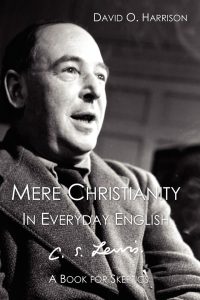 There are, no doubt, theological differences, such as the authority of the Pope; the number of sacraments — 7 (Catholic) or 2 (Protestant); the number of books in Holy Scripture — 73 (Catholic) or 66 (Protestant); and the Real Presence in the Eucharist.
There are, no doubt, theological differences, such as the authority of the Pope; the number of sacraments — 7 (Catholic) or 2 (Protestant); the number of books in Holy Scripture — 73 (Catholic) or 66 (Protestant); and the Real Presence in the Eucharist.
Yet all faithful Evangelicals and Catholics affirm the core fundamentals of the faith.
In the 20th century, the great Oxford don C. S. Lewis called this common ground “mere Christianity” in his best-selling book by that name. It is, he explained, the great core “common to nearly all Christians at all times.” Or as St. Vincent of Lérins described it in the year AD 434: Quod ubique, quod semper, quod ab omnibus — “What has been believed everywhere, always, and by all.”
The center of Christianity is six fundamental beliefs, and it might be presented by way of the acronym “JARVIS”:
- Jesus is God: He is the Second Person of the Holy Trinity.
- Atonement: Jesus paid for our sins by dying on the cross.
- Resurrection: Jesus rose from the dead. We celebrate this as Easter.
- Virgin Birth: Mary was a virgin, made pregnant by the Holy Spirit.
- Inspiration of the Bible: It is inspired by God, not merely man.
- Second Coming: The First Coming was when Jesus came in AD 1. We celebrate it as Christmas. Jesus will come back a second time.
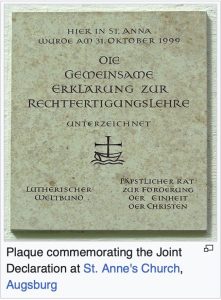 Nearly 50 years after the publication of Mere Christianity (1952), there was remarkable news to announce in 1999 with the Joint Declaration on the Doctrine of Justification. It states that there is now “a common understanding of our justification by God’s grace through faith in Christ.” The issue that long divided Protestants and Catholics — “How do I get to Heaven? — has been resolved. “As of 2017, the bodies representing 75% of the world’s Christians have formally affirmed the Joint Declaration,” reports Wikipedia.
Nearly 50 years after the publication of Mere Christianity (1952), there was remarkable news to announce in 1999 with the Joint Declaration on the Doctrine of Justification. It states that there is now “a common understanding of our justification by God’s grace through faith in Christ.” The issue that long divided Protestants and Catholics — “How do I get to Heaven? — has been resolved. “As of 2017, the bodies representing 75% of the world’s Christians have formally affirmed the Joint Declaration,” reports Wikipedia.
On the definition of the key term justification, or “salvation,” it affirms that Catholics and Evangelicals were speaking the same biblical truth, but using two different language systems, especially when referring to the terms saved and faith, both of which have a wide and a narrow definition in the Bible.
And so the good news after some 500 years of sharp division: “The biggest issue that ever divided Christians has been solved. . . . Incredible news,” explains Peter J. Kreeft.
To understand the Joint Declaration:
• A clear explanation by Prof. Kreeft can be found here (15 minutes), or a shorter summary below (7 minutes).
• For a written explanation, here is a link to a book chapter; see pages 24-25.
• Or for another audio explanation on “faith alone,” click here; it offers the helpful category of “initial justification.”
More efforts to unify Christians continue to this day.
Locking Arms
The oneness of Christianity existed for a thousand years. The first split came in 1054 with the Eastern Orthodox breaking off, and then their more formal break in the 1400s. The second split was the great divorce by way of the Reformation in the 1500s with Luther (Germany), Calvin (France), Zwingle (Switzerland), Knox (Scotland), and Wycliffe and King Henry VIII (England). Hundreds of different denominations resulted.
Since Jesus came to Earth, the first millennium was unity. The second millennium was division. Will the third be a re-unity? Only God knows. For now, we know that finding common moral cause is paramount in a culture that is desperate for the love and truth of Christ’s Church.
Here at FPIW, we make every effort to unite with our local and national allies. You can see a long list of our Strategic Partners in order to help advance and defend biblical values here in Washington State. We are delighted to partner with Katy Faust, the Founder & President of Them Before Us.
“Faithful Catholics and Protestants,” Faust points out, “may never worship under the same roof, but we can and must fight under the same banner for the sake of the children whose futures hang in the balance. Let’s debate with respect, but lock arms where it counts.”
To that, we say a heartfelt, “Amen!”
Transforming culture is important to us at FPIW, and we hope you share our sincere passion in defending and advancing Biblical and conservative values in the public square. Join us! Please sign up to become a Defender today, and join us in praying for our elected legislators.

